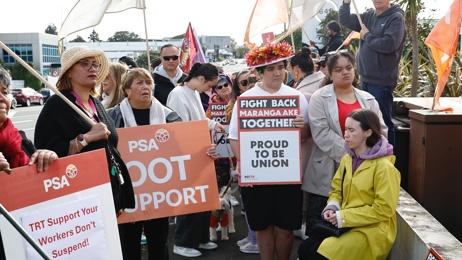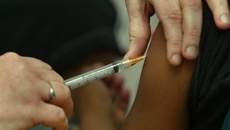A Tauranga resident who battled anxiety and depression for “years” says he could only get help after he reached his “very lowest”.
Cal Shimmin, 28, was one of about 15 people who attended a public meeting about mental health organised by the National Party at the Matua Bowling Club yesterday.
It was hosted by the party’s mental health and suicide prevention spokesman, Matt Doocey, and Tauranga MP Sam Uffindell.
At the meeting, Doocey said there needed to be “local solutions for local needs” for mental health issues and a 111 emergency line where people could call and have a trained crisis mental health professional dispatched.
He also said it was time for New Zealand to establish its first mental health and suicide prevention minister.
Speaking to the Bay of Plenty Times after the meeting, Shimmin said he felt awful for “years” due to anxiety and depression.
“I was suicidal for a very long time and it was only when I was at my very lowest I was actually able to get help.”
He did a few counselling sessions but they became restricted due to Covid-19 lockdowns.
“A lot of the time I’d go to the GP and we could discuss the issues but there wasn’t really a solution.”
Shimmin said he did not feel “functional” in the way he wanted to be.
His mental health had “stood in the way” of being able to work, but his family had been willing to help and house him.
Shimmin said having a dedicated minister for mental health would be “a step”.
“It’s quite easy to feel voiceless when you have [a] mental illness. I think that’s obviously a big step to focus so specifically on the matter.”
His mother, Sue Shimmin, said having a new minister would be good as she had experienced difficulty accessing help for her son.
“We’re all feeling helpless but there’s just no one to talk to because you’ve got to do this whole, ‘make an appointment, come in and see us’.
“You need a 111 for that [mental health].”
The National Party’s mental health and suicide prevention spokesman, Matt Doocey, and Tauranga MP Sam Uffindell. Photo / Alex Cairns
Doocey said the National Party believed there was a need for a dedicated position because the Health Minister role could be ”too focused on the physical health system at the expense of the mental health system”.
“And what we think now is actually we should separate those roles so there’s a dedicated mental health minister that focuses daily on the system and how to address the issues.”
He said Government health reforms had “some rationality” around physical treatment but mental health issues needed “local solutions”.
“How you respond to mental health issues and middle-aged dairy farmers where I live in North Canterbury could be potentially quite different than young Māori in South Auckland.
The National Party’s mental health and suicide prevention spokesman Matt Doocey said the younger generation had helped create a culture where people could ask for help. Photo / Alex Cairns
Doocey said if someone had a physical health crisis and called 111, they would get a health response. But if someone called for a mental health crisis, they would get a criminal justice response.
“So what I think we need to do is have co-response teams where we send out trained crisis mental health professionals.”
Such professionals also needed to be in dispatch centres to assess the calls, he said.
Tauranga MP Sam Uffindell said the mental health facilities in Tauranga were “not where they should be”.
“They need to be upgraded, they need to be upsized and unfortunately, there was funding that was set aside for that - that has been delayed which is really upsetting for our community, for our city.”
On May 29, Te Whatu Ora said in a media release that a plan to replace Tauranga Hospital’s acute mental health inpatient unit, for which funding was announced in 2019, was on hold until the future of the Tauranga Hospital site is known.
“We acknowledge the decision not to build a replacement facility now may be disappointing to the community, but it is worth remembering the current facility is relatively new, having been purpose-built in 2001.”
A smaller upgrade, increasing the number of beds at the existing facility by three, was expected to be done by late 2025.
In response to Doocey and Uffindell’s comments, Minister of Health Dr Ayesha Verrall told the Bay of Plenty Times the Government had created a mental health system “from the ground up” since 2017, and more than 2.8 million New Zealanders were now covered by primary providers.
Verrall said one reason for increased demand for acute services was that before the Government’s investment in mental health and addiction, there was not enough support to stop “small issues becoming big problems”.
“Now, for the first time, there are real services to help prevent more people from falling through the cracks.”
Verrall said the Government had put mental health support at doctors, schools, universities, online, on the phone and through smart apps so more people were receiving help.
Budget 2022 invested $18.7 million over four years in child and adolescent specialist mental health and addiction services, increasing the capacity to see around 1300 more children and young people per year by the end of the rollout, Verrall said.
The Budget 2019 suicide prevention investment had supported several initiatives including establishing Māori and Pacific Suicide Prevention Community Funds and establishing Aoake te Rā - a free national service for people bereaved by suicide which offers online and face-to-face services.
Where to get help
If it is an emergency and you feel like you or someone else is at risk, call 111.
For counselling and support
Lifeline: Call 0800 543 354 or text 4357 (HELP)
Suicide Crisis Helpline: Call 0508 828 865 (0508 TAUTOKO)
Need to talk? Call or text 1737
Depression helpline: Call 0800 111 757 or text 4202
For children and young people
Youthline: Call 0800 376 633 or text 234
What’s Up: Call 0800 942 8787 (11am to 11pm) or webchat (11am to 10.30pm)
The Lowdown: Text 5626 or webchat
For help with specific issues
Alcohol and Drug Helpline: Call 0800 787 797
Anxiety Helpline: Call 0800 269 4389 (0800 ANXIETY)
OutLine: Call 0800 688 5463 (0800 OUTLINE) (6pm-9pm)
Safe to talk (sexual harm): Call 0800 044 334 or text 4334
All services are free and available 24/7 unless otherwise specified.
For more information and support, talk to your local doctor, hauora, community mental health team or counselling service.
Megan Wilson is a health and general news reporter for the Bay of Plenty Times and Rotorua Daily Post. She has been a journalist since 2021.
Take your Radio, Podcasts and Music with you

/cloudfront-ap-southeast-2.images.arcpublishing.com/nzme/HNHS5A22YNAPVP6VFLBCZNTULQ.JPG)
/cloudfront-ap-southeast-2.images.arcpublishing.com/nzme/ZCKGTSGAMRFTFF7SKOLPIO4IXY.JPG)








